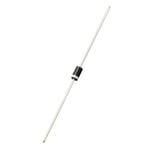
1N4749A
1N4749A is a type of diode that is designed to operate in the reverse breakdown region of its voltage-current characteristics.
Inquire Now
Description
1N4749A is a diode designed to operate in the reverse breakdown region of its voltage-current characteristic. In this region, the voltage across the diode remains relatively constant over a wide range of current levels. This makes Zener diodes useful for voltage regulation and voltage reference applications.
The 24V 1W Zener 5% Zener you mentioned is a special type of Zener. The rated breakdown voltage is 24 volts and the maximum power dissipation is 1 watt. The nominal voltage tolerance is 5%. This means that the actual breakdown voltage of the diode may vary within ±5% of the rated value.
Zener diodes are commonly used in electronic circuits. Used for voltage regulation, surge protection, and overvoltage protection. They are often used in combination with other components such as resistors and capacitors. to create voltage reference circuits and regulators. 24V 1W Zener Diode can be used in various applications requiring a stable 24V voltage reference or voltage regulation.
1N4749A Feature
- Breakdown voltage: The diode has a rated breakdown voltage of 24 volts. This means once the voltage across it reaches that value. It can conduct current in the opposite direction.
- Power dissipation: The diode has a maximum power dissipation of 1 watt. This means it can safely dissipate up to 1 watt of power without damage.
- Tolerance: Diodes have a 5% tolerance on their rated voltage. This means that the actual breakdown voltage of the diode may vary within ±5% of the rated value.
- Reverse leakage current: Zener diodes have very low reverse leakage current. This means it won't conduct much current in the reverse direction until it reaches its breakdown voltage.
- Small size: 24V 1W zener diodes are usually smaller in size. Therefore suitable for compact electronic circuits.
- Easy to use: Zener diodes are easy to use. Only a simple circuit configuration is require to provide voltage regulation or reference.
FAQ
Q:What is the maximum current that can flow through the 1N4749A?
A:The maximum current that can flow through the 1N4749A depends on the external circuit configuration. And the power dissipation of the diode. As a general rule, the maximum current should be keep below the rated power dissipation of 1 watt. To avoid damaging the diode.
Q:Can the diode be use in reverse bias mode?
A:Yes, Zener diodes are design to work in the reverse breakdown region. This means once the breakdown voltage is reach. It can conduct current in the opposite direction.
Q:Can the diode be use for voltage regulation?
A:Yes, the Zener diode can be use for voltage regulation by connecting it in parallel with a load resistor. The breakdown voltage of the diode will provide a stable voltage reference across the load resistor.
Q:What is the temperature coefficient of the diode?
A:The temperature coefficient of the diode refers to the change in its breakdown voltage with temperature. The exact value of the temperature coefficient may vary depending on the specific diode model. But usually around -2 mV/°C.
Q:How is the diode package identified?
A:A diode's package is usually identified by its part number. This includes information on breakdown voltage, power dissipation, tolerances and package types. The package type may be identify by a two or three-letter code, such as DO-41 or SOD-123.


























































































